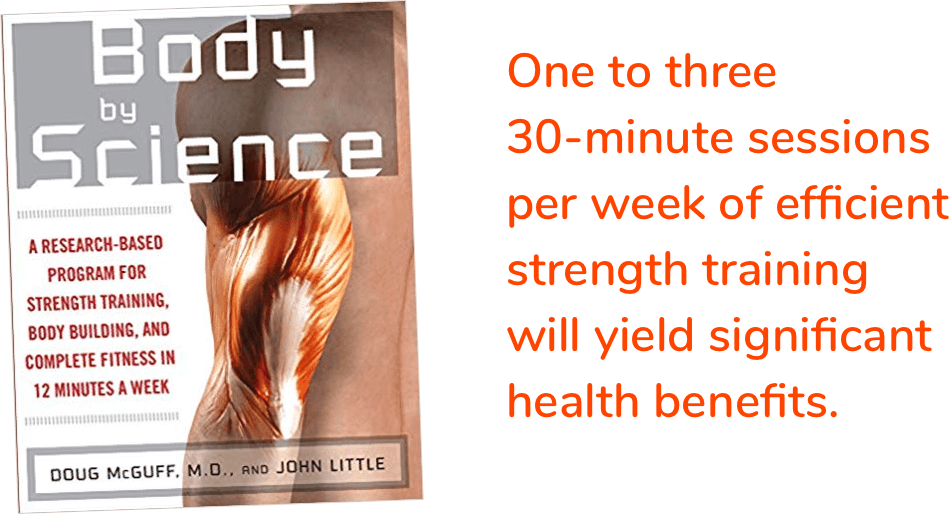Can Short Workouts Be Effective? What Does Medical Research Say?
Fri. Jul 19, 2019
Read in 4 minutes
Short or long strength training sessions: Which is better?
As a fitness consultant, I’ve been thinking about and working in the fields of exercise and nutrition for over twenty years.
People often ask me:
- Is a 10- or 20-minute workout enough to stay in shape (or get in shape)?
- Is it better to exercise in short bursts?
- How long should a beginner work out?
- Do I need to spend an hour in the gym for each session?
There are some popular — yet false — notions about what constitutes an effective training session and regimen.
Let’s take a closer look at these so you can understand what the science says.
But first, let’s consider the priority of setting aside some time for exercise.
Exercise is For Busy Baby Boomers, Like You
The most common excuse for not exercising is lack of time.
It is an excuse with which I empathize. After all, it is by the “unforgiving minute” as Kipling put it, that we measure out our lives and the things we value.
Vitality is a cornerstone of a well-lived life.
We spend a good deal of time sleeping. This is a biological necessity. And we spend an awful lot of time working. Our families and friends are priorities.
Is it any wonder that in the sea of values we pursue, some values, such as exercise get drowned out?
How to Make Time for What’s Important
But we need to “make time” for what is important. How do we do this?
The best way to prioritize fitness is to schedule time for working out.
Schedule time for working out.
Whether you use an online tool or a pad of paper, your workout time should be listed on your schedule.
By scheduling time for fitness, we prioritize it above lesser desires like finding a good movie to watch on the weekend or ordering a new flavor of coffee online.
Exercise Increases and Maintains your Vitality
There are at least two reasons why saying, “I don’t have the time” is an invalid excuse for not exercising.
- Proper exercise is essential to augmenting and maintaining our vitality. Because this vitality is a cornerstone of a well-lived life, exercise is one of the values we can scarcely ignore any more than good dental hygiene.
- Second, if more people understood that all they need is one to three 30-minute sessions per week to obtain all of the health benefits associated with exercise, they wouldn’t use the “no time” excuse card.
Medical Science: Short Exercise Sessions Really Do Work
It sounds like quackery but one to three 30-minute sessions per week is the only time investment necessary to get the cardiovascular, muscular and bone strengthening benefits that the best exercise provides.
One Hour a Week of Weight Lifting
For example, a recent research study published in the March 2019 edition of Medicine & Science in Sport & Exercise found that it only takes an hour or less of weight lifting per week to decrease your risk of cardiovascular disease and stroke by 40% - 70%.
The research study was led by Dr. Duck-Chul Lee, professor of Kinesiology at Iowa State University.
In an interview Lee said: “People may think they need to spend a lot of time lifting weights, but just two sets of bench presses that take less than 5 minutes could be effective.”
Body By Science by Dr. Doug McGuff
For an elaboration on this concept see chapter 5 in Body by Science by physician Doug McGuff and John Little.

For information on the medical science behind this approach, watch this video, “Strength Training for Health and Longevity” which features Doug McGuff, MD.
I also recommend this video by McGuff on “The Benefits of Exercise for the Over-40s.”
High Intensity Training
McGuff promotes HIT — or “High Intensity Training” — a particular form of strength training that emphasizes slow movements.
Double Your Strength
In an interview with HITuni, a training resource, McGuff said:
“Most people … within 12-20 weeks will expect to easily see their strength double and their body composition will improve markedly and it will seem almost — compared to other approaches that they may have tried — it will almost seem too easy to them.”
He added, “The results are predictable and come about quickly” and that his clients are “just mindblown.”
Our Training
Here at Inner Strength Fitness (ISF), we also use the same HIT principles and approach discussed by Dr. McGuff.
You can take action today.
Feel free to book a free phone consultation with me, Francisco Villalobos, the owner of ISF in New York City, to learn more.
We will discuss your goals and fitness challenges.
Find out now how you can get optimal outcomes from your fitness investment.
Recommended Reading
Weight Lifting is Good For Your Heart, and It Doesn’t Take Much - Iowa State University
Doug McGuff MD, explains High Intensity Training - video
Forget the Hotshot Trainer with the Six-Pack, Boomers Want Mature Fitness Coaches
This Wall St. Journal article explores why baby boomers want personal trainers their own age.